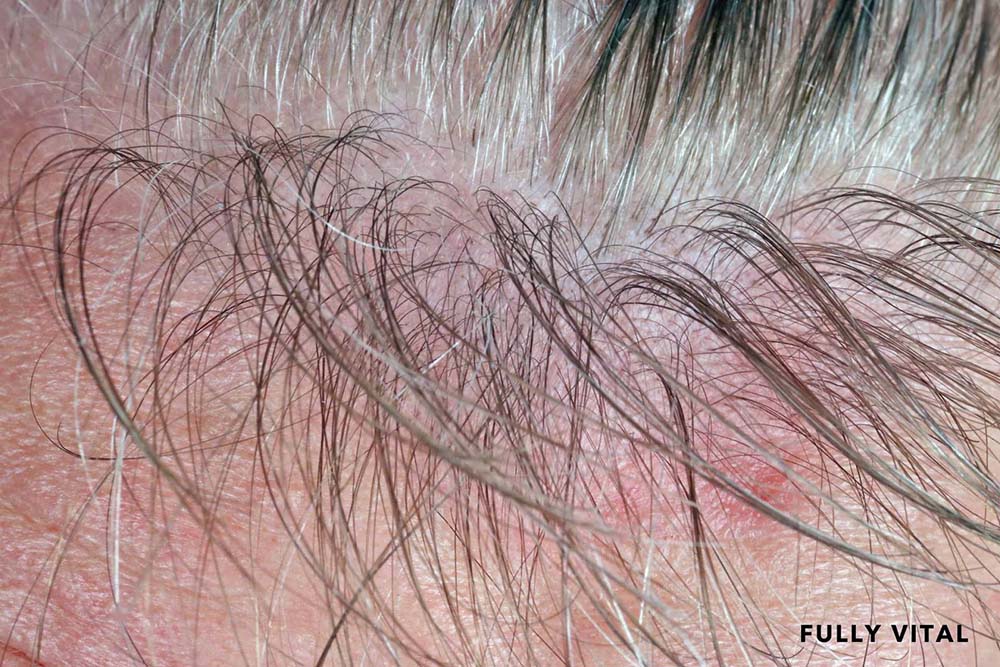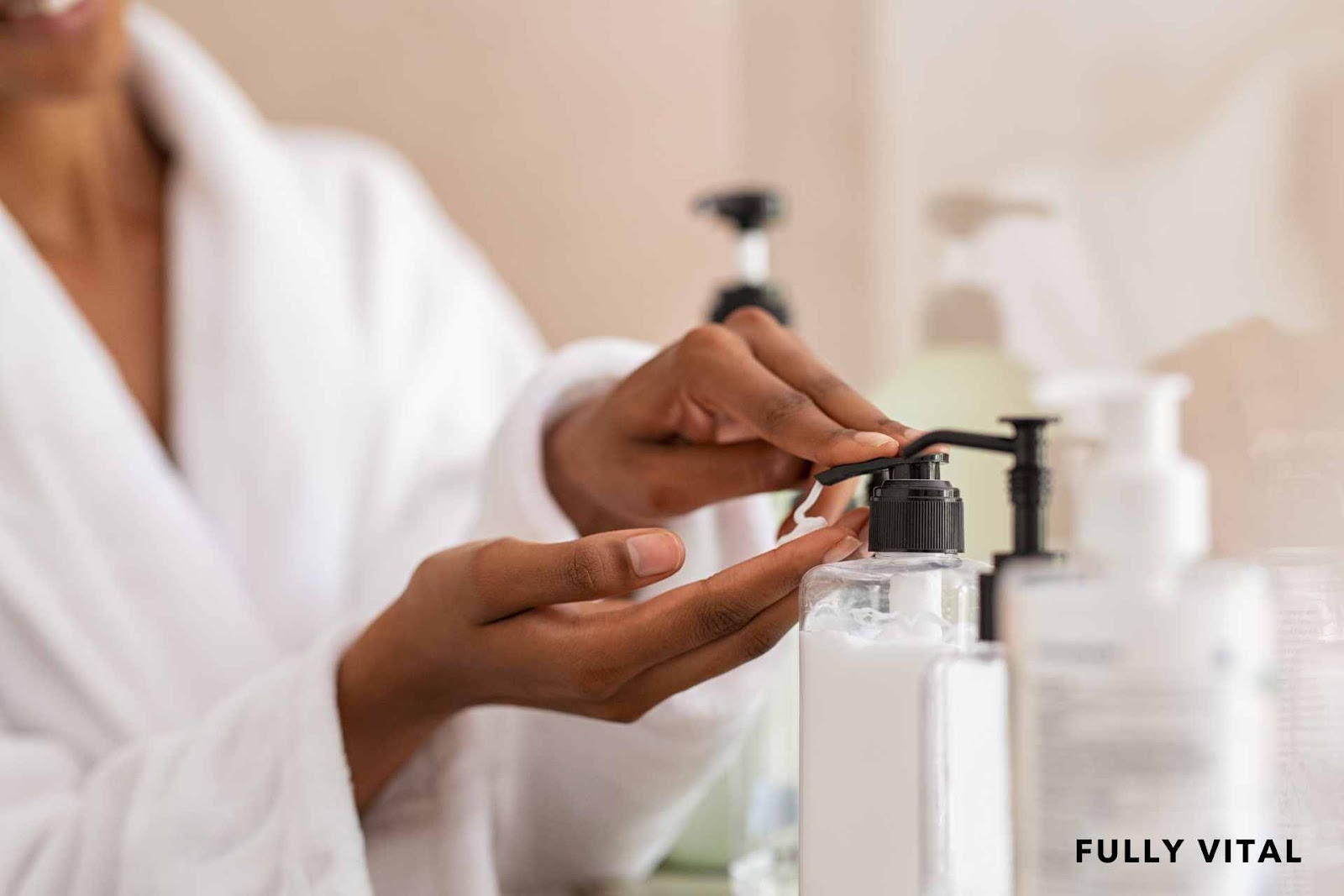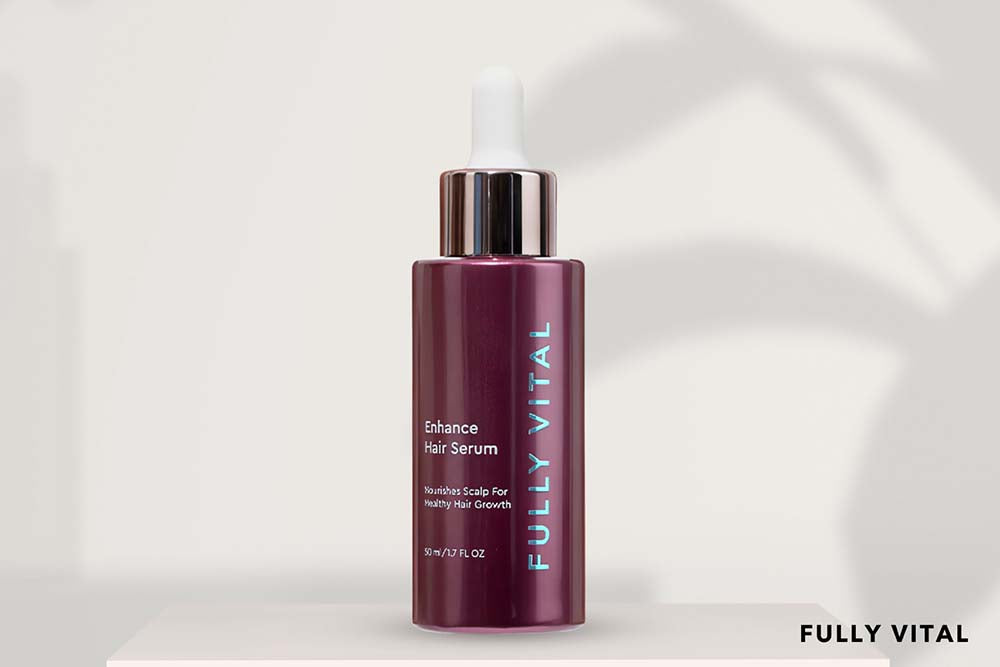
Clogged Hair Follicles: A Comprehensive Guide to Promoting Healthy Hair Growth
Welcome to our in-depth guide on clogged hair follicles! If you're a woman with any hair type, longing for vibrant and lush hair growth, you've landed on the perfect page.
In this article, we're going to explore the ins and outs of clogged hair follicles, covering treatments, preventive measures, and even professional interventions.
Whether your hair is straight, wavy, curly, or coily, our conversational guide is tailored to provide you with actionable insights to achieve your hair goals.
Let's get started!

I LOVE MY HAIR NOW
FullyVital hair serum and hair vitamins made tremendous improvements in my hair. I truly love my hair now.
Dorit S.,
Effective Treatment For Clogged Hair Follicles
When it comes to treating clogged hair follicles, there's a range of strategies that you can employ to rejuvenate your hair:
Harnessing the Power of Natural Remedies
-
Scalp Massages: Regularly massaging your scalp with nourishing oils like tea tree or rosemary stimulates blood circulation, helping to break down blockages and encourage hair growth.1
-
Exfoliation Techniques: Gentle exfoliation using specialized scrubs or brushes can effectively remove dead skin cells and excess sebum that contribute to clogged follicles.
-
Apple Cider Vinegar Rinse: The natural acidity of apple cider vinegar can balance the pH of your scalp, dislodging buildup and revitalizing your follicles.
Embracing Over-the-Counter Solutions
-
Clarifying Shampoos: Seek out shampoos formulated with salicylic acid or glycolic acid to deeply cleanse your scalp and follicles.
-
Topical Serums: Incorporate serums enriched with active ingredients like retinol or hyaluronic acid into your routine to unclog follicles and stimulate healthy hair growth.

Nurturing Hair Health: Preventing Clogged Hair Follicles
Taking proactive steps to prevent clogged hair follicles can greatly contribute to maintaining your hair's vibrancy and vitality:
Prioritizing Scalp Hygiene
-
Regular Cleansing: Consistent hair washing prevents the accumulation of oil, dirt, and debris on your scalp.2
-
Gentle Hair Products: Opt for sulfate-free and mild shampoos to cleanse without stripping away your scalp's natural oils.
Fueling Your Body with a Balanced Diet
-
Stay Hydrated: Drinking ample water keeps your scalp hydrated, promoting optimal hair health.
-
Nutrient-Rich Foods: Integrate vitamin-rich foods such as those high in vitamins A, C, and E, along with biotin and omega-3 fatty acids, into your diet for flourishing hair.3
Avoiding Traction Hairstyles
-
Loose Braids: Opt for looser hairstyles to reduce constant tension on your follicles, preventing potential damage.
-
Minimize Heat Styling: Limit the use of heat styling tools to preserve both your hair and scalp health.
Seeking Professional Interventions For Lasting Results
In certain instances, seeking professional guidance can yield the best results for addressing clogged hair follicles:
Consult a Dermatologist
-
Thorough Scalp Analysis: Dermatologists can diagnose the root causes of clogged follicles and provide tailored treatment recommendations.
-
Microdermabrasion: This procedure involves gently exfoliating the scalp with micro-crystals, effectively eliminating debris and promoting hair growth.
Enlist a Trichologist's Expertise
-
Holistic Hair and Scalp Evaluation: Trichologists specialize in hair and scalp health, offering insights into personalized treatments.
-
Prescription Solutions: Trichologists may prescribe medications to tackle inflammation, infections, or hormonal imbalances that contribute to clogged follicles.
What Are Clogged Hair Follicles?
Clogged hair follicles occur when the natural process of hair growth is obstructed by accumulated debris, dead skin cells, and excess sebum on the scalp.
These blockages hinder the hair's ability to grow and emerge from the follicle, leading to potential hair thinning and overall lackluster hair health.
Why Is It Important To Remove Clogged Hair Follicles?
Removing clogged hair follicles is crucial for maintaining healthy hair growth and scalp condition.
When follicles are blocked, hair cannot grow properly, leading to potential hair loss and decreased hair quality.
By clearing away these obstructions, you pave the way for vibrant and thriving hair growth.
How Do Clogged Hair Follicles Work?
Hair follicles are tiny cavities in the scalp from which hair grows.
When these follicles become clogged, the natural hair growth cycle is disrupted.
Hair strands get trapped underneath the debris, causing them to weaken, thin, and ultimately fall out. This cycle repeats, potentially leading to progressively poorer hair quality.
What Causes Clogged Hair Follicles?
Clogged hair follicles are a result of a combination of factors that disrupt the natural balance of the scalp environment and impede the hair growth cycle.
Let's delve deeper into the various elements that contribute to this common issue:
Buildup of Debris
The accumulation of debris on the scalp can lead to clogged follicles. This debris includes:
-
Dead Skin Cells: Over time, dead skin cells can accumulate on the scalp's surface, creating a barrier that prevents hair from growing properly.
-
Excess Sebum: The sebaceous glands produce sebum, a natural oil that lubricates the hair and scalp. However, excessive sebum production can lead to an oily scalp, creating an ideal environment for debris to stick and clog follicles.
-
Styling Product Residue: Regular use of styling products like gels, sprays, and mousses can leave behind residue that accumulates on the scalp, leading to blockages.
Hormonal Imbalances
Hormonal fluctuations can contribute to clogged hair follicles:
-
Androgens: Hormones like androgens, particularly dihydrotestosterone (DHT), can impact hair follicles. An excess of DHT can cause hair follicles to shrink, leading to thinner hair strands and eventual clogging.
-
Hormonal Changes: Events such as pregnancy, childbirth, and menopause can trigger hormonal imbalances that affect the health of hair follicles.
Poor Scalp Hygiene
Neglecting proper scalp hygiene can create an environment conducive to clogged follicles:
-
Infrequent Washing: Irregular washing can lead to the accumulation of dirt, oils, and debris on the scalp, obstructing hair follicles.
-
Use of Harsh Products: Overuse of harsh shampoos or styling products can strip the scalp of its natural oils, leading to dryness and increased production of sebum as a defense mechanism.
Tight Hairstyles
Certain hairstyles contribute to clogged hair follicles by causing constant tension and pressure:
-
Braids: Tight braids can pull on the hair and scalp, leading to inflammation and potential clogging of follicles.
-
Ponytails: Wearing tight ponytails can lead to hair breakage at the root and hinder proper blood circulation in the scalp.
-
Hair Extensions: Heavy hair extensions can strain hair follicles and cause them to become blocked.
What Are The Downsides Of Clogged Hair Follicles?
The repercussions of clogged hair follicles extend far beyond the surface, impacting both the health of your hair and the condition of your scalp.
Let's delve into the comprehensive list of downsides associated with clogged follicles:
Thinning Hair
Clogged hair follicles can lead to visibly thinner hair over time:
-
Impaired Growth: Obstructed follicles hinder proper hair growth, causing hair to appear thinner and more sparse.
-
Weak Hair Strands: Hair emerging from clogged follicles can be weaker and more prone to breakage, further contributing to thinning.
Hair Loss
Severe clogging of follicles can lead to hair loss, presenting the following challenges:
-
Follicle Dormancy: Persistently clogged follicles can become dormant, ceasing to produce new hair strands.
-
Progressive Thinning: Continued obstruction can lead to a gradual decrease in hair volume, resulting in noticeable hair loss.
Scalp Conditions
Clogged hair follicles create an environment conducive to various scalp issues:
-
Dandruff: Blocked follicles can lead to the buildup of dead skin cells, contributing to the development of dandruff.
-
Inflammation: Inflamed follicles may cause discomfort, itchiness, and redness on the scalp.
-
Itchy Scalp: Obstructed follicles can trap dirt and bacteria, leading to itching and irritation.
Reduced Hair Health
Clogged follicles negatively impact the overall health and appearance of your hair:
-
Lackluster Shine: Hair emerging from clogged follicles may lack the natural shine and vibrancy associated with healthy hair.
-
Vulnerable to Damage: Weakened hair strands are more susceptible to damage from external factors like heat styling and environmental stressors.
Hindered Styling
Clogged follicles can limit your hairstyling options:
-
Limited Volume: Thinning hair due to clogged follicles can make it challenging to achieve voluminous hairstyles.
-
Difficulty Holding Styles: Weakened hair strands may struggle to hold styles, impacting the longevity of your desired look.
Self-Esteem Impact
The visible effects of clogged follicles can influence self-esteem and confidence:
-
Aesthetic Concerns: Thinning hair and hair loss can affect how you perceive yourself and how others perceive you.
-
Emotional Distress: Hair-related concerns can lead to emotional stress and reduced overall well-being.
What Are The Alternatives To Prevent Clogged Hair Follicles?
Preventing clogged hair follicles involves a combination of practices and alternatives:
Gentle Cleansing
-
Mild Shampoos: Use sulfate-free shampoos to cleanse without stripping natural oils.
-
Regular Washing: Establish a routine to prevent debris buildup.
Scalp Exfoliation
-
Exfoliating Scrubs: Incorporate scalp scrubs to remove dead skin cells and residue.
-
Soft Brushes: Use soft brushes to gently exfoliate the scalp during washing.
Proper Hydration
-
Adequate Water Intake: Stay hydrated to support scalp health and hair growth.
-
Hydrating Masks: Use moisturizing hair masks to nourish your scalp.
Hairstyle Choices
-
Loose Styles: Opt for looser hairstyles to reduce strain on follicles.
-
Avoid Tight Accessories: Minimize the use of tight hairbands and clips.
Unlock the Secret to Timeless Hair with Fully Vital!Experience the magic of Fully Vital's science-backed hair growth products, designed to transform your hair journey. Discover how our products can help you regain your hair's youthful vitality and cultivate a healthier connection with your locks. Key Features:
Benefits:
Join us in our mission to enhance your hair's natural beauty and vitality. Dive into the world of Fully Vital and discover how our products can help you create a powerful, positive change in your hair care routine. It's time to revitalize your locks and embrace a more beautiful, confident you! |
Final Thoughts On Clogged Hair Follicles
In the journey towards achieving luscious and vibrant hair growth, understanding the nuances of clogged hair follicles plays a pivotal role.
By recognizing the causes, downsides, and preventive measures associated with this common issue, you're equipped with the knowledge needed to foster a healthier relationship with your locks.
Remember, maintaining a clean and well-nourished scalp, embracing proper hygiene practices, and seeking professional interventions when necessary are all essential steps to prevent and address clogged hair follicles.
As you embark on this path to hair wellness, keep in mind that a holistic approach can yield the best results.
At Fully Vital, we're passionate about providing you with effective solutions to promote the health and vitality of your hair.
Our range of hair growth products is designed to combat the effects of aging and nurture your hair to its full potential.
Say hello to healthier hair and bid farewell to the challenges posed by clogged follicles.
Your journey to vibrant hair growth starts here!
Frequently Asked Questions About Clogged Hair Follicles
Can clogged follicles lead to hair loss?
Yes, clogged follicles can impede hair growth and potentially result in thinning or hair loss if left unaddressed.
Is daily hair washing necessary to prevent clogs?
The frequency of washing varies based on your hair type.
Excessive washing can strip your scalp of natural oils, so finding a balance is key.
Are there specific foods that aid in preventing clogged follicles?
Absolutely, a diet rich in vitamins, minerals, and protein contributes to the overall health of your hair and scalp.
Can stress contribute to clogged hair follicles?
Stress can indeed disrupt hormone equilibrium, leading to increased sebum production and potential clogs.
How do you reopen hair follicles?
Reopening hair follicles involves a combination of practices to improve blood circulation and remove blockages.
Consider these methods:
-
Scalp Massage: Regularly massaging your scalp with essential oils can stimulate blood flow and help open up follicles.
-
Exfoliation: Gently exfoliate the scalp to remove debris and encourage healthy hair growth.
-
Topical Treatments: Use serums with active ingredients to dissolve buildup and encourage follicle activity.
How do you know if follicles are alive?
The viability of hair follicles can be assessed through various indicators:
-
Visible Hair: If you have visible hair growth, it's a sign that the follicles are active.
-
Scalp Sensation: A tingling or itching sensation on the scalp can indicate follicle activity.
-
New Hair Growth: The emergence of new hair strands signifies active follicles.
Is it possible to regrow hair follicles?
Regrowing hair follicles is challenging, but certain treatments may help:
-
Micro-needling: This procedure stimulates the scalp, potentially encouraging dormant follicles to reactivate.
-
Platelet-Rich Plasma (PRP) Therapy: PRP injections contain growth factors that can stimulate follicles.
What stimulates hair follicle growth?
Several factors can stimulate hair follicle growth:
-
Healthy Scalp: A clean and well-maintained scalp supports optimal follicle activity.
-
Blood Circulation: Good blood flow delivers essential nutrients to follicles, promoting growth.
-
Nutrition: A balanced diet rich in vitamins, minerals, and proteins fuels follicle health.
Which vitamin deficiency causes hair loss?
Vitamin deficiencies, particularly in the following nutrients, can contribute to hair loss:
-
Biotin: A lack of biotin (vitamin B7) can weaken hair structure and lead to hair loss.
-
Vitamin D: Insufficient vitamin D levels are associated with hair thinning and loss.
What does a dead follicle look like?
A dead hair follicle appears as a small, empty pocket on the scalp with no visible hair growth.
It won't respond to stimulation or produce new hair strands
Sources:
-
Scalp Massage for Hair Growth: Does It Really Work? (2019, November 22). Healthline. https://www.healthline.com/health/scalp-massage-for-hair-growth
-
Hair and Scalp Hygiene | CDC. (2022, July 14). Www.cdc.gov. https://www.cdc.gov/hygiene/personal-hygiene/hair-scalp.html
-
familydoctor. (2010, May). Changing Your Diet: Choosing Nutrient-rich Foods - familydoctor.org. Familydoctor.org. https://familydoctor.org/changing-your-diet-choosing-nutrient-rich-foods/







